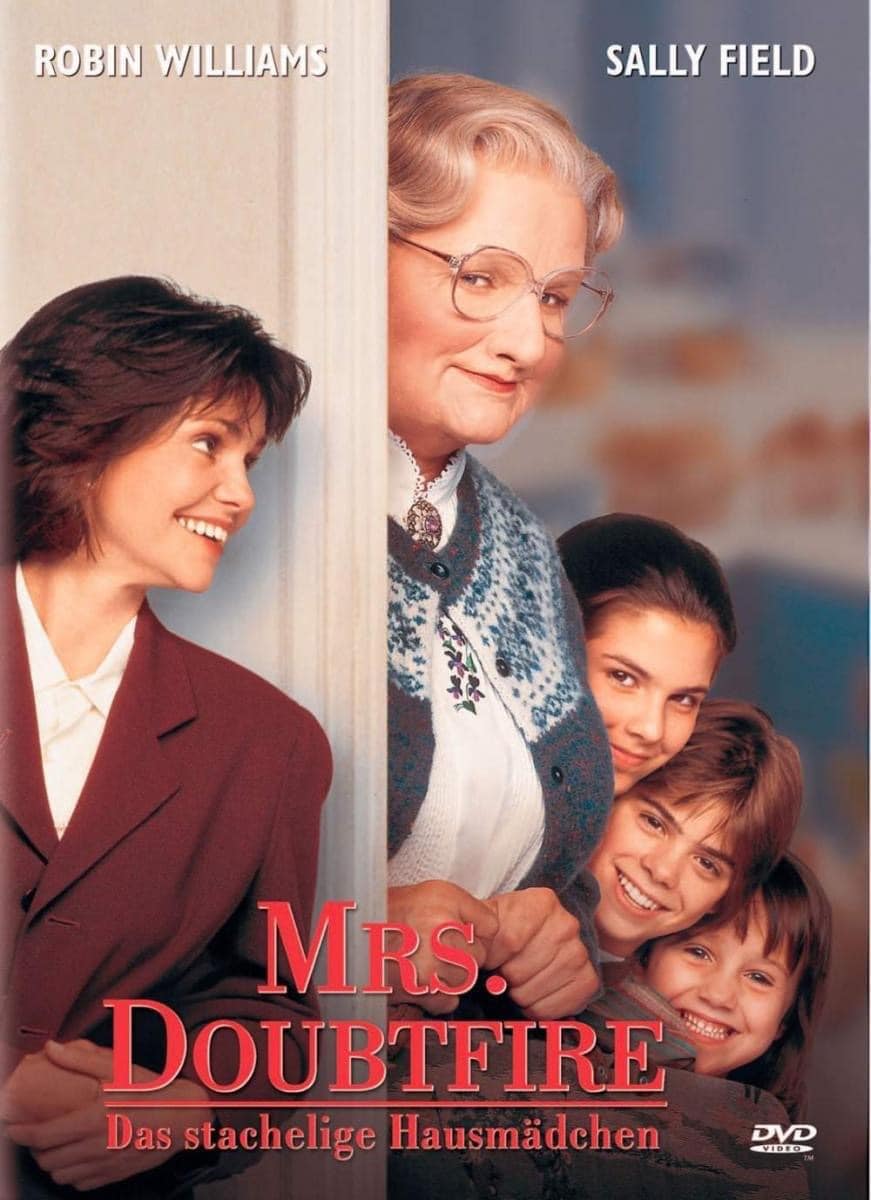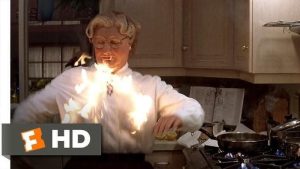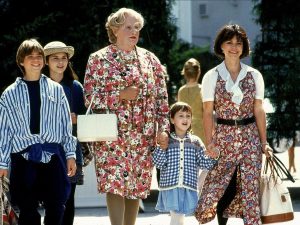Mrs. Doubtfire (1993)

Mrs. Doubtfire (1993) Review
Mrs. Doubtfire (1993), directed by Chris Columbus and starring Robin Williams, is a heartwarming and hilarious family comedy that blends slapstick humor with deeper themes of family, identity, and love. The film remains one of Robin Williams’ most iconic roles and is a testament to his ability to blend comedy with genuine emotion. It’s a story of a man who, in the wake of his divorce, goes to extreme lengths to stay involved in his children’s lives, all while wearing a disguise that brings both laughs and heartfelt moments.
Plot:
Daniel Hillard (Robin Williams) is a talented but irresponsible voice actor who, after a messy divorce, is left unable to see his children as often as he would like. Devastated by the separation from his kids—Lydia (Lisa Jakub), Chris (Matthew Lawrence), and Natalie (Mara Wilson)—Daniel comes up with an outrageous plan to spend more time with them. He disguises himself as an elderly Scottish woman named Mrs. Doubtfire and applies for the role of the children’s nanny

Through the transformation, Daniel not only gets to be close to his children but also learns valuable lessons about responsibility, personal growth, and the nature of his relationship with his ex-wife, Miranda (Sally Field). As Mrs. Doubtfire, Daniel navigates the challenges of keeping up his dual identity while trying to prove himself as a better parent.
While the premise is comedic, the film also explores the complexities of divorce and parenting. Daniel’s deep love for his children drives him to extreme lengths, and his journey highlights the importance of family, communication, and compromise.
Performances:
Robin Williams is the heart and soul of the film. His portrayal of Daniel Hillard is both wildly funny and deeply moving. Williams is a master of physical comedy, and his transformation into Mrs. Doubtfire is a brilliant showcase of his comedic talents. The character of Mrs. Doubtfire, with her old-school charm and quirky mannerisms, is an unforgettable creation. Williams’ ability to switch between humor and pathos allows the film to juggle lighthearted moments with more emotionally intense scenes, making it resonate with audiences of all ages.
Sally Field delivers a strong performance as Miranda, Daniel’s ex-wife. Miranda is a hardworking, independent woman who struggles with her emotions and her complicated relationship with Daniel. Field brings depth to the role, balancing the frustration of her divorce with the love she still feels for her children and the conflicted feelings she has toward Daniel’s eccentric approach to parenting.

Pierce Brosnan plays Stuart Dunmeyer, Miranda’s new boyfriend, and while his character serves mostly as a foil to Daniel, Brosnan’s smooth, charming portrayal adds an additional layer of tension to Daniel’s comedic antics as Mrs. Doubtfire. Brosnan is a perfect contrast to Williams’ high-energy performance, and their dynamic offers plenty of laughs.
The kids, played by Mara Wilson, Lisa Jakub, and Matthew Lawrence, are also well-cast. They bring sincerity to their roles as children caught in the middle of their parents’ divorce, and their reactions to Daniel’s increasingly absurd behavior help ground the film in real emotional stakes.
Themes:
Family and Parenthood: The film’s central theme is the importance of family and the lengths to which parents will go to maintain relationships with their children. Daniel’s transformation into Mrs. Doubtfire serves as a metaphor for his desire to reconnect with his kids, to prove he’s a capable, loving parent despite his earlier mistakes. His dedication to his children is evident, even if his methods are unorthodox.
Divorce and Identity: Divorce is at the heart of Mrs. Doubtfire. The film explores how children cope with their parents’ separation, as well as the emotional toll it takes on both the parents and the children. Daniel’s disguise symbolizes his struggle with his identity post-divorce. His journey involves learning that his role as a parent isn’t tied to a specific image of who he is, but to his love and commitment to his children.
Identity and Transformation: The film also tackles the theme of personal transformation, both for Daniel and the people around him. As Daniel becomes Mrs. Doubtfire, he learns the value of responsibility and maturity, and the experience forces him to confront his own flaws. The transformation isn’t just external—it’s an emotional and psychological journey that deepens his connection with his family.
Humor and Heart: While Mrs. Doubtfire is primarily a comedy, it never loses sight of its emotional core. The balance between laugh-out-loud humor and sincere, heartfelt moments is one of the film’s greatest strengths. The comedy isn’t just about the outrageous situations Daniel finds himself in as Mrs. Doubtfire—it also comes from the relatable, human experiences of trying to maintain a relationship with loved ones despite personal shortcomings.

Tone:
The tone of Mrs. Doubtfire is a perfect blend of light-hearted comedy and emotional warmth. The humor is often slapstick and over-the-top, but it is tempered by genuine moments of tenderness. The film is designed to make you laugh, but it also tugs at the heartstrings. Daniel’s heartfelt moments with his children and his self-discovery provide a depth to the film that elevates it beyond a typical comedy.
The movie’s pacing is excellent, balancing the more humorous moments with moments of introspection and growth. The comedic situations Daniel gets into—especially as Mrs. Doubtfire—are timeless, from his attempts to juggle his two identities to his increasingly elaborate ruses. But it’s the emotional resolution of Daniel’s journey that ultimately makes the film resonate.
Conclusion:
Mrs. Doubtfire is a classic family comedy that has stood the test of time. Robin Williams’ transformative performance is at the heart of the film, bringing both comedy and emotion in equal measure. The film blends slapstick humor with important messages about love, family, and personal growth, making it more than just a feel-good comedy. It’s a movie that can make you laugh, cry, and reflect on the importance of family bonds and second chances.











